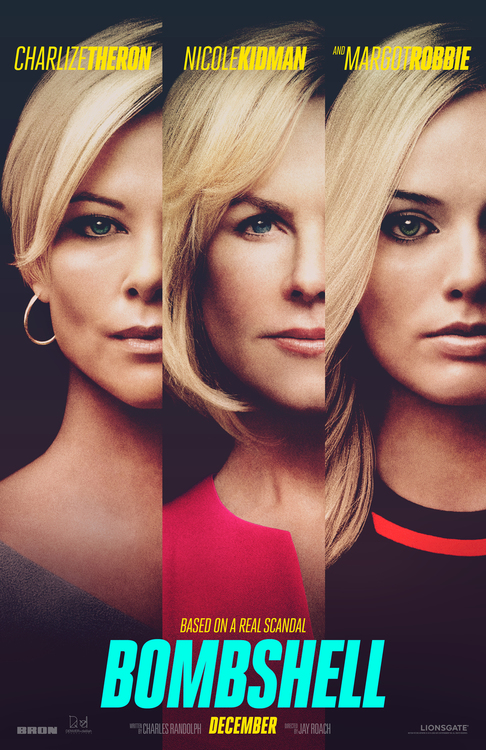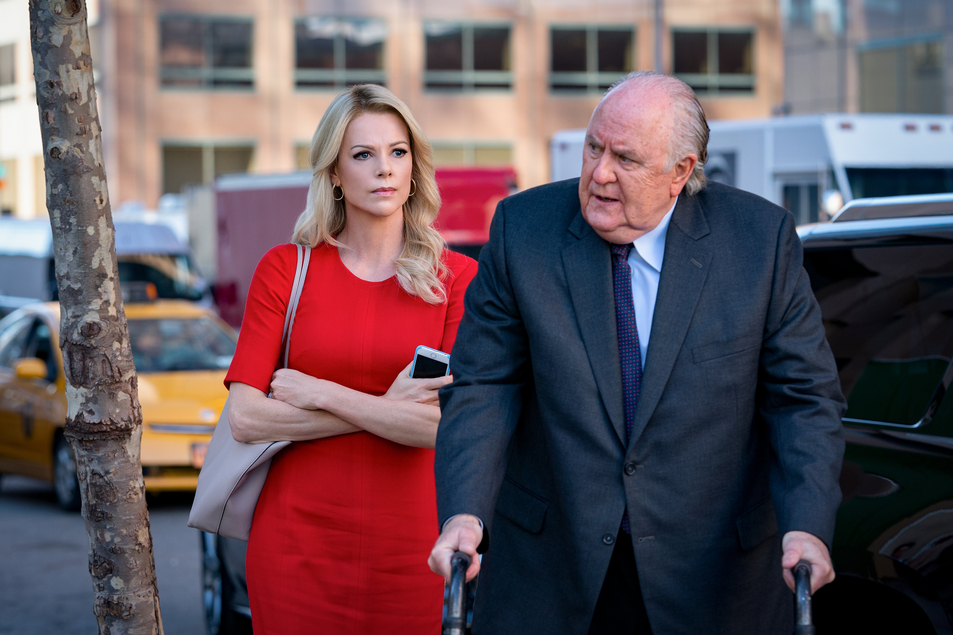
Release Date: December 20th, 2019
Cast: Charlize Theron, Nicole Kidman, John Lithgow, Kate McKinnon, Connie Britton, Malcolm McDowell, Allison Janney, Margot Robbie
Director: Jay Roach
Studio: Bron Creative, Annapurna Pictures, Denver + Delilah Productions, Gramsci, Lighthouse Management & Media, Creative Wealth Media
Distributor: Lionsgate
Spoilers: Low
IMDB| Rotten Tomatoes | Wikipedia
Rating: ★★★☆☆

A warning that this review and the film it discusses contain material relating to sexual assault and homophobia.
Bombshell, the latest docu-drama from director Jay Roach (Austin Powers, Trumbo) and screenwriter Charles Randolph (The Big Short) depicts the real-life events surrounding former Fox News anchor Gretchen Carlson (Nicole Kidman) and her sexual assault lawsuit against former Fox CEO Roger Ailes (John Lithgow).
The film also explores the role that Megyn Kelly (Charlize Theron) played in the lawsuit and her own assault by Ailes, as well as the assault of ambitious Fox producer Kayla (Margot Robbie) with aspirations for a position as anchor. The three protagonists are possibly the most potent part of this film, which seeks to humanize people that the American public has only known as television personalities as the lawsuit at the center of this film unfolds.
Narratively, Bombshell is strung together with several important and powerful beats, like beads on a necklace. Among these beads are some uncomfortable and daunting scenes as each protagonist recounts her assault, consoles her peers, and, for Kayla, experiences assault firsthand. These moments are hard to watch but the film demands that its audience watch them, often in uncomfortably close close-ups that linger for bordering-on-too-long.
The emotional beats played through the performance and cinematography are powerful in recounting the shame, pain, and violation that these women felt. The occasional directorial flourish from Roach augments the performances of the film’s stars, like putting some scenes in complete silence, framing others with the tenor of a horror scene, or following the shifty eyes and whispers of an office on the brink of civil war. These moments can feel clean and poignant or clumsy and heavy-handed, but the former make the latter worth it.
However, the string between these scenes is not particularly engaging, with several plodding scenes, some loose pacing, and certain scenes that could be cut altogether. Sometimes, the writing feels like it is attempting to write a new tagline to the film with every other line. The occasional punctuation of a line of dialogue as the crux of the scene can operate on multiple levels. It helps audiences keep the moment in mind, mimics the sound-byte vernacular of news-speak, and builds towards a central thesis. However, the frequency of which these rousing lines are spoken ultimately weakens their impact.
This movie is desperate to be seen in every sense of the word. On the one hand, there is an earnest desire to show its subjects as humans deserving of compassion, even as Lithgow’s Ailes labels them as ungrateful and attention-seeking; on the other hand, the script and style of Bombshell is filmed in a way that increasingly draws attention to its characters even when it feels superfluous.

Inevitably, the crux of Bombshell that is immediately politically relevant. Part of this is how recent the events (c. 2015-2016) depicted have happened, alongside the looming presence of the Trump presidency just beyond the horizon of the film. It is made all the more perceptible that this review is being written the night that the House of Representatives has voted to pass articles of impeachment against President Donald Trump.
The closing title cards point out that the women of Fox were among the first to challenge a public figure as powerful as Ailes, but not the last, gesturing to the #MeToo movement and other efforts to combat the culture of sexual misconduct in the entertainment industry and corporate America.
What makes Bombshell relevant three years after the documented events is that the ramifications of the story are still shaking out, the pieces have not stopped falling into place quite yet. The power structures that makes it so difficult for the women at Fox to come forward for fear of losing their jobs and friends are still very much in place.
Towards the end of Bombshell there is a moment when Robbie’s Kayla walks out of the Fox newsroom, now under direct control by its owner, Rupert Murdoch, throwing away her security badge as Kate McKinnon’s closeted-lesbian producer hides a picture of her partner. In a voice over, Kayla asks, “Will it be the same somewhere else?” Although there’s good that comes from removing the most flagrant abusers like Ailes (and later Bill O’Reilly), the fight against a culture that allows people in power to abuse that power still rages on. This is echoed in Kidman’s final beat of the movie as she dares Fox to keep a “muzzle” on this story, itself a parallel to Carlson’s real-life fight with Fox to lift its NDA that was part of her settlement with Ailes.
Ultimately, I can’t decide if this means that Bombshell was made too early, that perhaps there is not enough distance between it and its subject matter; or if it’s the perfect time, its presence all the more important in order to remind us what was so hard won in such a short time.